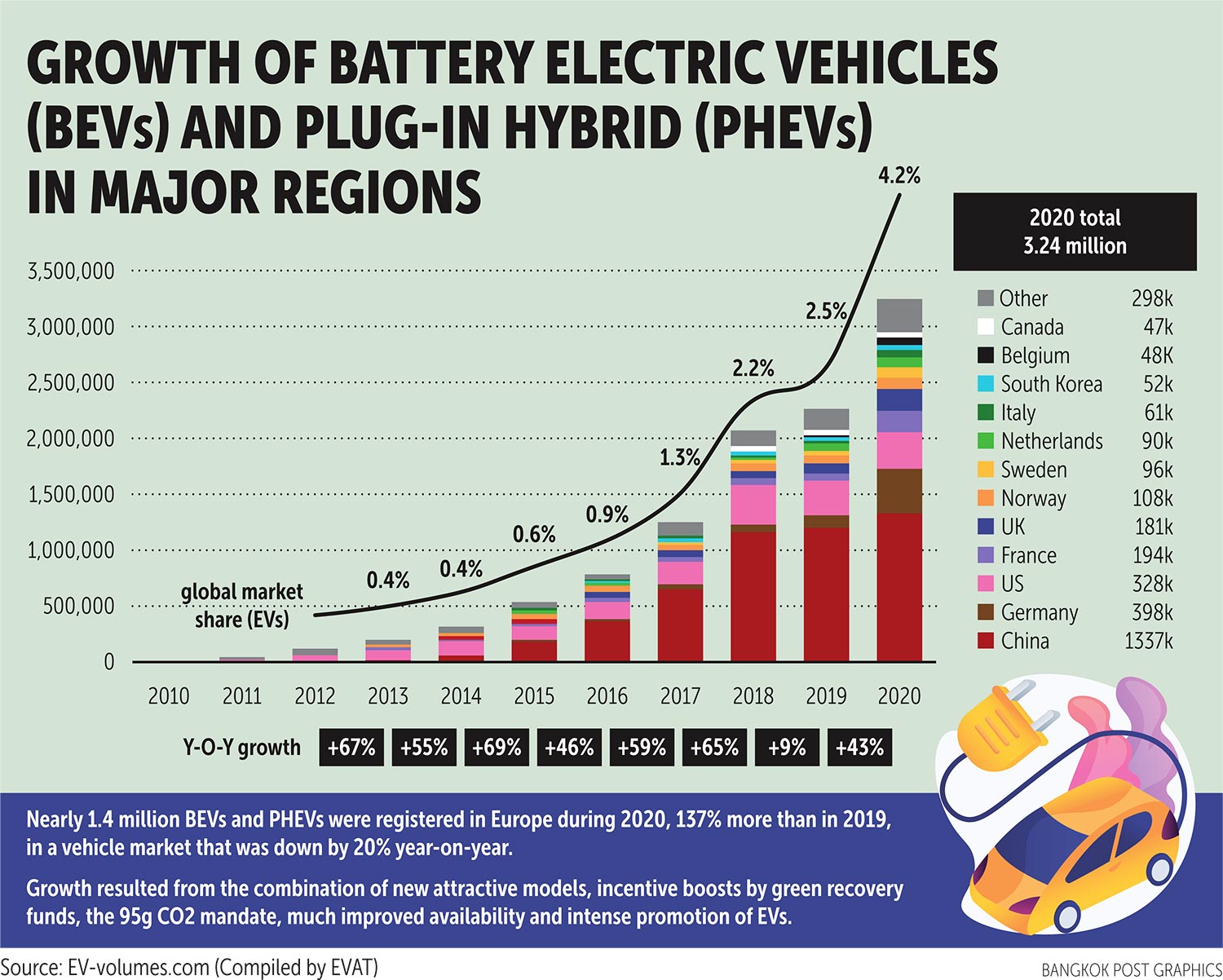
Hailing 2020 as a “great year” for electric vehicle (EV) sales in the global market, Krisda Utamote, president of the Electric Vehicle Association of Thailand (EVAT), is eager to see a similar growth in Thailand with the spotlight on the EV industry.
But a focus on EV numbers alone is not enough as the state and private sector need to work on building an environment conducive to EV development, covering incentives for more production and purchases as well as bracing for the impact on internal combustion engine-based (ICE) product lines, he said.
“Thailand recorded EV registrations totalling 100,000 units, but the numbers are still far behind the target,” said Mr Krisda.
Previously the government set a target to have EVs make up 30% of total car manufacturing, around 750,000 of 2.5 million units, within 2030.
But it decided on March 24 to increase the target to 50%, following the rapid growth of EVs in many countries, especially in Europe.
This should prompt Thai authorities to step up efforts to promote EVs and seriously consider the impact of the technological change, he said.

Environmentally, the more Thai motorists turn to EVs, the better the air quality because electric mobility is a key technology to reduce air pollutants, said Mr Krisda.
CO2 emissions are attributed for global warming and a subsequent unpleasant climate change, he said.
In Thailand, a larger number of EVs should help the government curb harmful levels of PM2.5 ultra-fine dust, mostly emitted by ageing oil-powered vehicles on crowded streets in major cities, including Bangkok.
RIGHT DIRECTION
With the 50% goal, EVAT suggests the government issues a clear EV infrastructure development plan, including increasing the number of EV charging stations.
As of November last year, the total number of EV charging outlets in Thailand stood at 1,974, covering 600 areas, according to EVAT.
“The previous plan with a target of 750,000 EVs already required around 70,000 charging outlets,” said Mr Krisda.
The 50% goal means more charging facilities are needed and the target adjustment may also require a measure to ban ICE vehicles to better develop the EV market, he said.
With no ICE sales, all new cars will avoid producing exhaust fumes. Only battery electric vehicles, or BEVs, and fuel cell-powered cars will be used, said Mr Krisda.
Fuel cell is a technology that changes chemical energy into electricity.
A ban on ICE vehicles has been adopted in many countries, including Norway, Britain, France and India.
It may be difficult for Thailand to follow suit, but EVAT, state agencies and major car companies have begun discussing an ICE ban, he said.
“We talked about state EV policy as well as the latest update on the ICE ban,” said Mr Krisda, referring to EVAT’s recent talks with the Office of Industrial Economics and the Energy Ministry.
Any ICE ban is speculative and may not be suitable for Thailand at this moment, he said.
DIM PROSPECTS
Growth of the EV industry will affect makers of auto parts for ICE vehicles as many of their products will no longer be in demand, with automakers switching focus to EVs, said Mr Krisda.
A technological disruption in the automotive supply chain is unavoidable and increasing annual EV sales is a sign for original equipment manufacturers in the conventional car market to consider how to balance addressing current needs for the ICE industry with future demand for EVs, he said.
Many suppliers told EVAT they agree with new investment in EV parts, but they want a clearer government policy to justify adjusting their businesses accordingly.
However, the adjustment may be difficult for small and medium-sized suppliers that lack financial flexibility, said Mr Krisda.
He said the business outlook for the ICE vehicle market requires a serious rethink in addition to state tax incentive programmes, including tax holidays of 5-8 years and import duty exemptions for cars and machinery to promote the EV industry.
GLOBAL TREND
“The world saw a sharp increase in EV numbers last year, including BEVs and plug-in hybrid electric vehicles (PHEVs),” said Mr Krisda.
Sweden-based EV business data provider ev-volumes.com reported nearly 1.4 million BEVs and PHEVs were registered in Europe in 2020, a 137% increase from 2019.
The growth resulted from various factors, including new attractive models, incentive boosts by green recovery funds and intense promotion of EVs.
The Paris Climate Agreement to curb global warming also played a major role in pushing forward EV market development.
The administration of US President Joe Biden decided to have the US rejoin the Paris Climate Agreement after its withdrawal from the pact during the Donald Trump administration out of concerns over the economic burden.
This decision should also fuel EV growth, he said.
“I believe Mr Biden will push forward the EV industry rapidly because he is focused on efforts to reduce greenhouse gas emissions,” said Mr Krisda.
